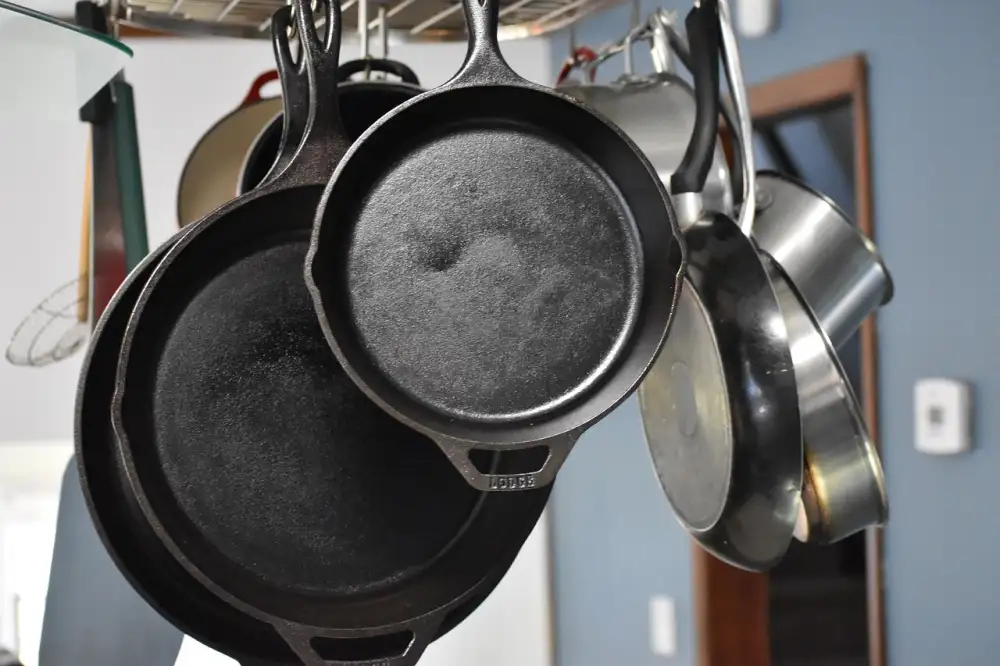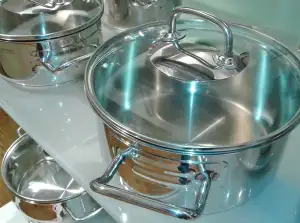Effortless Cast Iron Skillet Cleaning Tips for a Spotless Home

Cleaning a cast iron skillet may seem like a daunting task, but with the right techniques and tools, it can be effortless. Cast iron skillets are beloved for their ability to distribute heat evenly and create delicious meals. However, they require special care to maintain their quality and prevent rusting. In this article, we will guide you through the process of cleaning your cast iron skillet, from gathering the necessary supplies to storing it properly. With these tips, you'll be able to enjoy a spotless and well-maintained cast iron skillet for years to come.
Gather necessary cleaning supplies
To effectively clean a cast iron skillet, it's important to gather the necessary cleaning supplies beforehand. Having these items on hand will make the cleaning process much easier and more efficient. Here are the essential supplies you'll need:
1. Hot water: Make sure you have access to hot water for rinsing and washing the skillet.
2. Mild dish soap: Choose a gentle dish soap that won't damage the seasoning of the skillet.
3. Non-abrasive scrub brush or sponge: Look for a brush or sponge specifically designed for cast iron cleaning to avoid scratching the surface.
4. Coarse salt: Coarse salt acts as a natural abrasive and helps remove stubborn food particles without damaging the skillet.
5. Paper towels or clean cloth: These will be used for drying the skillet after washing.
By gathering these necessary cleaning supplies, you'll be well-prepared to tackle any dirt or residue on your cast iron skillet and ensure its longevity.
Preparing the cast iron skillet for cleaning
Before you begin cleaning your cast iron skillet, it's important to prepare it properly. Start by removing any excess food particles or residue from the surface of the skillet. You can use a paper towel or a soft brush to gently scrape off any stubborn bits.
Next, rinse the skillet with hot water to further loosen any remaining debris. Avoid using soap at this stage as it can strip away the skillet's seasoning. Instead, rely on the power of hot water and gentle scrubbing to get rid of any stuck-on food.
If there are still some stubborn stains or residues, you can create a paste using coarse salt and water. Apply this paste to the affected areas and use a sponge or cloth to scrub gently. The abrasive nature of the salt will help lift off any tough stains without damaging the skillet's surface.
Once you've thoroughly cleaned the skillet, rinse it again with hot water to remove any salt residue. Make sure all traces of food and cleaning agents are completely gone before proceeding to dry and season your cast iron skillet.
By taking these preparatory steps, you'll ensure that your cast iron skillet is ready for a deep clean, leaving it spotless and ready for future cooking adventures.
Cleaning the cast iron skillet
Cleaning the cast iron skillet is a crucial step in maintaining its longevity and ensuring that it continues to provide excellent cooking results. To clean your skillet, start by rinsing it with hot water immediately after use. Avoid using soap, as it can strip away the skillet's seasoning.
For stubborn food residue, use a stiff brush or non-abrasive sponge to scrub the surface gently. If needed, sprinkle some coarse salt onto the skillet to help remove stuck-on food particles. Be sure to scrub all areas of the skillet, including the sides and handle.
Once you have removed all the residue, rinse the skillet thoroughly with hot water to remove any remaining salt or debris. Pat dry with a clean towel or paper towels.
Remember never to soak your cast iron skillet or leave it submerged in water for an extended period as this can cause rusting. Instead, dry it immediately after washing to prevent moisture from lingering on its surface.
If you encounter any stubborn stains or rust spots during cleaning, you may need to re-season your cast iron skillet. This involves applying a thin layer of oil (such as vegetable oil or flaxseed oil) over the entire surface of the skillet and heating it in an oven at a low temperature for about an hour. Repeating this process will help restore and maintain the skillet's seasoning.
By following these simple cleaning steps regularly, you can keep your cast iron skillet spotless and ready for many delicious meals ahead!
Drying and seasoning the cast iron skillet
After cleaning your cast iron skillet, it is important to dry it thoroughly to prevent rusting. Start by using a clean, dry cloth or paper towels to remove any excess moisture. Next, place the skillet on a stovetop burner set to low heat for a few minutes. This will help evaporate any remaining moisture.
Once the skillet is completely dry, it's time to season it. Seasoning creates a protective layer on the surface of the skillet and enhances its non-stick properties. To season your cast iron skillet, apply a thin layer of cooking oil or shortening all over the inside and outside surfaces. Make sure to coat every nook and cranny.
Place the skillet upside down in an oven preheated to 350°F (175°C). Let it bake for about an hour. This process allows the oil or shortening to polymerize and form a durable seasoning layer on the skillet.
After an hour, turn off the oven and let the skillet cool down inside before removing it. Once cooled, use another clean cloth or paper towel to wipe off any excess oil or shortening.
Repeat this seasoning process periodically to maintain your cast iron skillet's non-stick surface and prevent rusting. The more you use and season your cast iron skillet, the better its performance will be.
Remember not to use soap when cleaning your seasoned cast iron skillet as it can strip away the seasoning layer. Instead, gently scrub with hot water and a brush or sponge.
By following these simple steps for drying and seasoning your cast iron skillet, you can ensure its longevity and enjoy cooking with it for years to come.
Storing the cast iron skillet
Storing the cast iron skillet is just as important as cleaning it. After ensuring that the skillet is completely dry, it's time to find a suitable spot for it in your kitchen. Avoid storing it in a damp or humid area, as this can lead to rusting. Instead, choose a cool and dry place, such as a cupboard or pantry.
To prevent any moisture from accumulating on the skillet, you can place a paper towel or cloth inside before closing the lid. This will help absorb any excess moisture and keep your skillet in top condition.
If you have multiple cast iron skillets, stack them with a layer of paper towel or cloth between each one to prevent scratching and damage. Alternatively, you can hang your skillet using a pot rack or hooks to save space and ensure proper air circulation.
Remember to avoid storing any food in the skillet, as this can attract pests and lead to unpleasant odors. Instead, store your cast iron skillet empty and ready for its next cooking adventure.
By following these simple storage tips, you can ensure that your cast iron skillet remains clean and well-maintained for years to come.
Tips for maintaining a clean cast iron skillet
1. Avoid using soap: Soap can strip away the seasoning on your cast iron skillet, so it's best to avoid using it. Instead, rely on other cleaning methods.
2. Use a brush or scraper: After each use, use a stiff brush or scraper to remove any food particles or residue from the skillet. This will make the cleaning process much easier.
3. Avoid soaking in water: While it's tempting to soak your cast iron skillet to loosen stubborn food particles, this can actually lead to rusting. Instead, opt for a quick rinse with hot water and scrubbing if necessary.
4. Dry thoroughly: After washing your skillet, make sure to dry it thoroughly. Leaving any moisture on the surface can also cause rusting.
5. Apply a thin layer of oil: To maintain the seasoning of your skillet, apply a thin layer of oil after each use. This will help prevent rust and keep your skillet in top condition.
6. Store properly: When storing your cast iron skillet, make sure it is completely dry and store it in a cool, dry place to prevent moisture buildup and rusting.
By following these simple tips, you can ensure that your cast iron skillet remains clean and well-maintained for years to come, allowing you to enjoy delicious meals without any hassle or worry about cleaning up afterwards.
By following these effortless cleaning tips, you can ensure that your cast iron skillet remains spotless and in excellent condition for years to come. The process may seem daunting at first, but with the right supplies and a little bit of care, maintaining a clean cast iron skillet becomes second nature.
Remember to always gather the necessary cleaning supplies before starting the cleaning process. Preparing the skillet by removing any food residue and grease is crucial for effective cleaning. Use gentle scrubbing techniques with a non-abrasive brush or sponge to avoid damaging the seasoning.
Cleaning the skillet with hot water and mild dish soap helps remove stubborn stains without stripping away the seasoning. Avoid using harsh chemicals or abrasive cleaners as they can damage the skillet's surface.
After cleaning, thoroughly dry the skillet to prevent rusting. Place it on low heat on the stovetop or in an oven set at a low temperature until completely dry. Once dry, apply a thin layer of oil to season and protect the skillet.
Proper storage is essential for maintaining a clean cast iron skillet. Store it in a cool, dry place to prevent moisture buildup and rust formation. Consider placing a paper towel between stacked skillets to absorb any excess moisture.
To keep your cast iron skillet looking its best, remember these maintenance tips: never soak it in water, avoid using metal utensils that can scratch the surface, and periodically re-season it to maintain its non-stick properties.
With these simple steps, you can enjoy cooking delicious meals in your clean and well-maintained cast iron skillet. So go ahead, whip up those mouthwatering recipes with confidence, knowing that your trusty kitchen companion is ready for any culinary adventure!
Published: 28. 12. 2023
Category: Home



